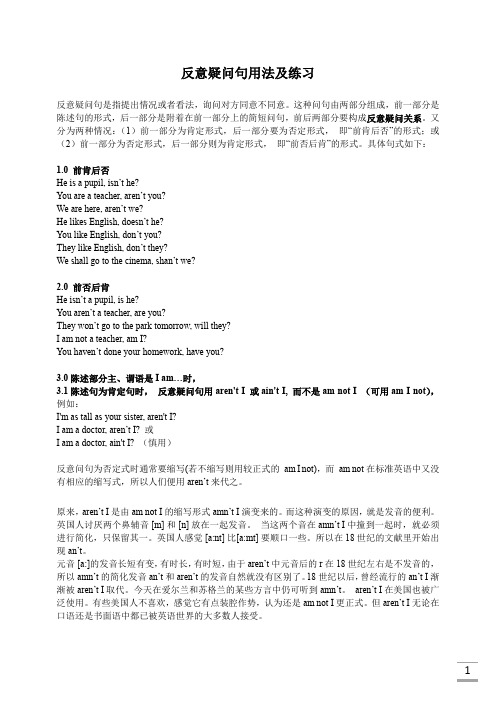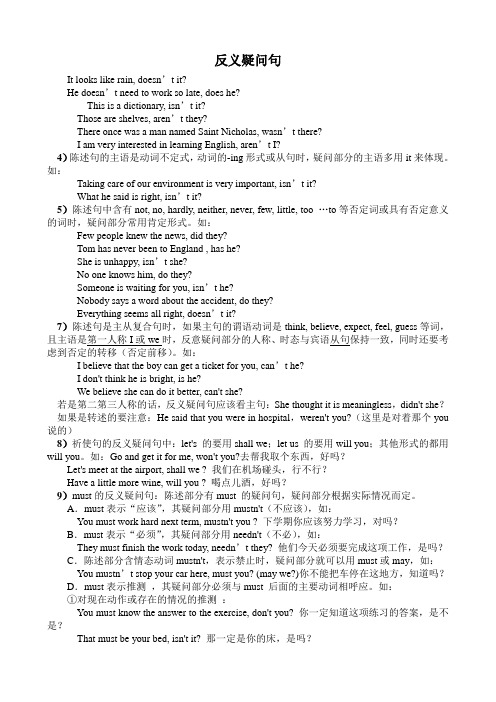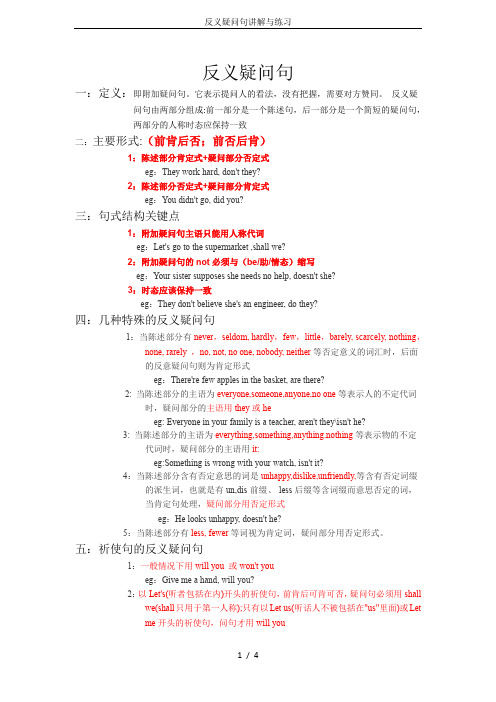新人教版必修一Unit3 重点语法:反义疑问句学习讲义+练习题
反义疑问句讲解和练习(答案 )

反意疑问句一、英文中的反意疑问句。
1、什么是反意疑问句英语中,反意疑问句是由陈述句和附在其后的附加疑问句组成。
其中附加疑问句是对陈述句所说的事实或观点提出疑问,起证实作用,一般用于证实说话者所说的事实或观点。
翻译为“是吗”2.反意疑问句的回答,回答时,如果情况属实,用Yes加上反问句的倒装肯定句;若果情况不属实,则用No加上反问句的倒装否定句。
例如You were moved by your students, weren’t you?情况属实:Yes, I were.情况不属实:No, I weren’t.二、反意疑问句中问句部分的动词与陈述部分的动词在语气上成相反的对应关系,即:肯定+否定?否定+肯定?如:1 You can’t do it, can you? 你不能做它,是吗?②They are very late for the meeting, aren’t they? 他们开会迟到了,是吗?三.当陈述句中含有be动词,助动词,或是情态动词时,反问句部分由这些词加上主语人称代词构成。
She is a lovely girl, isn’t she? 她是一个可爱的女孩,是吗?He will go home, __won’t__ __he__?他要回家了,是吗?She doesn’t l ike to eat popcorn, __does__ _she___?她不喜欢吃爆米花,是吗?The baby won’t sleep early, will it?小宝宝睡得不早,是吗?注意:He has supper at home every day,doesn’t’t he? (不能用hasn’t he?) 他每天在家吃晚饭,是吗?They have known the matter, haven’t they? (不能用don’t they?) 他们已经知道那事情了,是吗?小试牛刀:It’s very hot today, _______________ ?He can speak Chinese, _______________ ?It _______________ a good day for swimming, is it?Tom has been to Singapore , _______________ ?She doesn’t like climbing hills , _______________ ?四.当陈述句中只含有行为动词时,若动词加了s,就用does,若动词为原形,就用do,动词为过去式,则用did,例如:You cleaned your house last week, _didn’t___ __you__?你上周打扫了你的房间,是吗?Your father plays the computer very well, __doesn’t__ ___he _?你父亲电脑技术很好,是吗?They look so happy today, _don’t ___ _they___?你今天看起来很高兴,是吗?小试牛刀: Meimei studies in a middle school, _______________ ?He loves cold weather , _______________ ?You finished the task yesterday, _______________ ?五.反意疑问句的陈述部分带有little, few, never, hardly, seldom,nobody, nothing, barely, scarcely等否定意义的词时,问句部分用肯定式。
反义疑问句练习题(附答案)

反意疑问句反意疑问句一、祈使句后的反意疑问句:祈使句后加一个反意疑问句,使祈使句变得更加委婉。
肯定祈使句的反意疑问句通常用will you, won’t you, would you, can you, can’t you等来表达不同的含义。
在否定的祈使句后的反意疑问句通常只用will you。
表示“请求”,肯定祈使句的反意疑问句用will you。
如:Give me a hand, will you?2、表示“邀请”、“劝诱”时,肯定祈使句后的反意疑问句用won’t you。
如:Have another cup of tea, won’t you?3、表示“催促”、“不耐烦”时,肯定祈使句后的反意疑问句用can’t you。
如:Stop talking, can’t you?4、用“Let’s…”开头的肯定祈使句表示“提议、建议、主张”,其后的反意疑问句用shall we。
如:Let’s have a try, shall we?但是以Let us…或Let me…开头的祈使句后的反意疑问句则要用will you。
如:Let us go now, will you?5、否定祈使句的反意疑问句只用will you。
如:Don’t take away my dictionary, will you?以Let’s not…开头的祈使句后的反意疑问句,用all right或OK。
二、复合句的反意疑问:复合句的反意疑问的主谓语要视其主要内容而定,不能一概说以主句为准还是以从句为准。
1、多数复合句后的反意疑问句的主、谓语同主句的主、谓语一致。
如:He said he was a teacher, didn’t he主句是I think(suppose, consider, believe, guess, expect, imagine, feel, am afraid, hear, say等)+宾语从句时,反意疑问句的主、谓语应与从句的主、谓语一致。
反义疑问句用法及练习题(附答案)

反意疑问句用法及练习反意疑问句是指提出情况或者看法,询问对方同意不同意。
这种问句由两部分组成,前一部分是陈述句的形式,后一部分是附着在前一部分上的简短问句,前后两部分要构成反意疑问关系。
又分为两种情况:(1)前一部分为肯定形式,后一部分要为否定形式,即“前肯后否”的形式;或(2)前一部分为否定形式,后一部分则为肯定形式,即“前否后肯”的形式。
具体句式如下:1.0 前肯后否He is a pupil, isn’t he?You are a teacher, aren’t you?We are here, aren’t we?He likes English, doesn’t he?You like English, don’t you?They like English, don’t they?We shall go to the cinema, shan’t we?2.0 前否后肯He isn’t a pupil, is he?You aren’t a teacher, are you?They won’t go to the park tomorrow, will they?I am not a teacher, am I?You haven’t done your homework, have you?3.0陈述部分主、谓语是I am…时,3.1陈述句为肯定句时,反意疑问句用aren't I 或ain't I, 而不是am not I (可用am I not),例如:I'm as tall as your sister, aren't I?I am a doctor, aren’t I?或I am a doctor, ain't I? (慎用)反意问句为否定式时通常要缩写(若不缩写则用较正式的am I not),而am not在标准英语中又没有相应的缩写式,所以人们便用aren’t来代之。
反义疑问句讲解及习题及答案

知识梳理句型解释1.陈述部分肯定式+疑问部分否定式可记为前肯后否2.陈述部分否定式+疑问部分肯定式可记为前否后肯主语一般词语附加疑问句中主语用和主语一致的主语,用主格。
不定代词当陈述部分的主语是( 1 )用one 时,后面的疑问句可用one/he.(2)everything,anything,nothing,something时,附加疑问句中主语用it 不用 they (3)this,that,或those,these时,附加疑问句中主语用it和they.(4)everyone,everybody,someone,somebody等,附加疑问句中主语一般用he/they. (5)不定式,动名词,其他短语,附加疑问句中主语一般用it。
(6)在there be句型中,附加疑问句中主语一般用be/情态动词/助动词+there。
特殊句型否定意义的词否定意义的词(1)当陈述部分有never,seldom, hardly,few,little,barely, scarcely, nothing 等否定意义的词时,后面的反意疑问句则为肯定形式:There are few apples in the basket, are there?He can hardly swim, can he?They seldom come late, do they?(2)当陈述部分含有否定意思的词是unhappy,dislike,unfriendly等含有否定词缀的派生词,也就是有un-前缀、-less后缀等含有词缀而意思否定的词,当做肯定句处理,疑问部分要用否定形式。
如:He looks unhappy,doesn't he?他看上去不高兴,不是吗?The girl dislikes history,doesn't she?这女孩不喜欢历史,不是吗?有less,fewer等词视为肯定词,疑问部分用否定形式。
如:There will be less pollution, won't there?表示主语主观意愿的词含有think, believe, suppose, imagine, expect等动词后接宾语从句构成的主从复合句在构成反意疑问句时,视情况不同有两种不同的构成方式。
反义疑问句知识点详细讲解及练习

反义疑问句It looks like rain, doesn’t it?He doesn’t need to work so late, does he?This is a dictionary, isn’t it?Those are shelves, aren’t they?There once was a man named Saint Nicholas, wasn’t there?I am very interested in learning English, aren’t I?4)陈述句的主语是动词不定式,动词的-ing形式或从句时,疑问部分的主语多用it来体现。
如:Taking care of our environment is very important, isn’t it?What he said is right, isn’t it?5)陈述句中含有not, no, hardly, neither, never, few, little, too …to等否定词或具有否定意义的词时,疑问部分常用肯定形式。
如:Few people knew the news, did they?Tom has never been to England , has he?She is unhappy, isn’t she?No one knows him, do they?Someone is waiting for you, isn’t he?Nobody says a word about the accident, do they?Everything seems all right, doesn’t it?7)陈述句是主从复合句时,如果主句的谓语动词是think, believe, expect, feel, guess等词,且主语是第一人称I或we时,反意疑问部分的人称、时态与宾语从句保持一致,同时还要考虑到否定的转移(否定前移)。
反义疑问句讲解及习题及答案

知识梳理之袁州冬雪创作句型诠释1.陈述部分必定式+疑问部分否定式可记为前肯后否2.陈述部分否定式+疑问部分必定式可记为前否后肯主语一般词语附加疑问句中主语用和主语一致的主语,用主格.不定代词当陈述部分的主语是( 1 )用one 时,后面的疑问句可用one/he.(2)everything,anything,nothing,something时,附加疑问句中主语用it 不必 they(3)this,that,或those,these时,附加疑问句中主语用it和they. (4)everyone,everybody,someone,somebody等,附加疑问句中主语一般用he/they.(5)不定式,动名词,其他短语,附加疑问句中主语一般用it.(6)在there be句型中,附加疑问句中主语一般用be/情态动词/助动词+there.特殊句型否定意义的词否定意义的词(1)当陈述部分有never,seldom, hardly,few,little,barely, scarcely, nothing 等否定意义的词时,后面的反意疑问句则为必定形式:There are few apples in the basket, are there?He can hardly swim, can he?They seldom come late, do they?(2)当陈述部分含有否定意思的词是unhappy,dislike,unfriendly等含有否定词缀的派生词,也就是有un-前缀、-less后缀等含有词缀而意思否定的词,当做必定句处理,疑问部分要用否定形式.如:He looks unhappy,doesn't he?他看上去不高兴,不是吗?The girl dislikes history,doesn't she?这女孩不喜欢汗青,不是吗?有less,fewer等词视为必定词,疑问部分用否定形式.如:There will be less pollution, won't there?暗示主语主观意愿的词含有think, believe, suppose, imagine, expect等动词后接宾语从句构成的主从复合句在构成反意疑问句时,视情况分歧有两种分歧的构成方式.(1.)当主句的主语为第一人称时,其后的简短问句应与从句相一致.例如:I expect our English teacher will be back this weekend, won't she/he?We suppose you have finished the project, haven't you?值得注意的是,当这些动词后接的宾语从句的否定转移到主句时,其仍属否定句,故其后的简短问句应用必定式,而非否定式.例如:I don't believe that he can translate this book, can he?We don't imagine the twins have arrived, have they?此类句子的回答同"前否后肯"型反意疑问句一样,如上述后一个句子,若双胞胎已经到了,则回答为"Yes, they have.";若尚未到达,使用"No, they haven't.".(2).当主句的主语为第二、三人称时,其后的简短问句则应与主句相一致(此时,否定只看主句,与从句无关...).例如:Your sister supposes she needs no help, doesn't she?You thought they could have completed the project, didn't you? They don't believe she's an engineer, do they?She doesn't expect that we are coming so soon, does she?(3)但如果主句的时态是过去时等等,疑问句应和主句的人称时态坚持一致. had better或have陈述部分有had better,或其中的have暗示完成时态时,疑问句应用hadn’t等开首:You’d better get up early, hadn’t you?其他情况句中有have时疑问句应用don't等开首如have暗示“有”的时候,有两种形式:-He has two sisters,doesn't he?-He doesn't have any sisters,doeshe?祈使句当陈述部分是祈使句时,疑问句要根据语气来表达当开首是Let‘s时,一定要用shall we.其余都用will you(包含 Let us)不管必定否定Let’s go out for a walk, shall we?Let us go out for a walk, will you?Let me help you,may I?Turn on the radio, will you?There be句型There be 句型中,反义疑问部分必须为be 动词 + thereThere are some apples in the basket, aren't there?There isn't any milk left, is there?must.当陈述部分有情态动词must,问句有4种情况:(1)mustn't暗示“制止,不成,不必”时,附加问句通常要用must.You mustn't stop your car here,must you? 你不克不及把车停在这地方,知道吗?(2)must暗示“有需要”时,附加问句通常要用needn't.They must finish the work today,needn't they? 他们明天要完成这项工作,是吗?(3)当must用来暗示对现在的情况停止推测时,问句通常要根据must后面的动词采取相应的形式. He must be good at English,isn't he? 他英语一定学得很好,是吗?(4)当must+have done暗示对过去的情况停止推测(一般句中有明白的过去时间状语),问句要根据陈述部分谓语的情况用“didn't+主语”或“wasn't/weren't+主语”;如果强调动作的完成(一般没有明白的过去时间状语),问句要用“haven't/hasn't+主语”.She must have read the novel last week,didn't she? 她上星期一定读了这本小说,是吗?You must have told her about it,haven't you? 你一定把这事告诉她了,是吗?回答反意疑问句的回答用yes, no,但是,回答意思相反,当陈述部分是否定形式时,回答要按事实.如:They don’t work hard, do they? 他们不太尽力工作,是吗?Yes, they do. 不,他们工作尽力./No, they don’t. 对,他们工作不尽力必定反意疑问句的回答当陈述部分为否定式,反意疑问句为必定式时,其回答往往与汉语纷歧致,需特别引起注意:"It isn’t cheap, is it?" "Yes, it is." “它不便宜吧?”“不,很便宜.”"He doesn’t love her, does he?" "No, he doesn’t."“他不爱她,是吗?”“是的,他不爱她.”此时,"Yes"即不,对前面"It isn't cheap."的否定.否定反意疑问句的回答当陈述部分为必定式,反意疑问句为否定式时,其回答一般不会造成坚苦,一般只需照情况回答即可:"It’s new, isn’t it?" "Yes, it is." “是新的,对吗?”“对,是新的.”"He wants to go, doesn’t he?" "No, he doesn’t." “他想去,对吗?”“不,他不想去.”此时,"Yes"即是,对前面"It's new."的必定.回答反意疑问句的原则回答反意疑问句通常应根据实际情况来确定,如有人问你You are asleep, aren’t you? 你应回答No, I’m not. 因为既然你能回答,必定你还没有asleep.但如果他人问你 You aren’t asleep, are you?(你还没有睡着,对吗),你也只能回答No, I’m not.(是的,还没有睡着),而不克不及回答为Yes, I’m not. 也不克不及回答成 Yes, I am.“It is a beautiful flower,isn't it?”“It isn't a beautiful flower,is it?”上述两句句子的回答必定均为“Yes,it is."否定为“No,it isn't."由上述例子可知,反义疑问句回答与句子自己所包含的中文必定与否的含义并没有太大关联,只需注意事实,必定即用yes,否定用no,无需思索句子原本是前否后肯或是前肯后否.反义疑问句操练典题精析1. Linda ate nothing this morning, ___?A. didn’t sheB. was sheC. did sheD. wasn’t she2. There’s hardly___ milk in the bottle, _____there?A. no, isn’tB. some, isC. little, isn’tD. any, is3. He has never ridden a horse before, ___?A. does heB. has heC. hasn’t heD. doesn’t he4. —He seldom came here, _____? —Yes sir.A. didn’t heB. does heC. doesn’t heD. did he5. Everything seems all right, _____ ?A. does itB. don’t theyC. won’t itD. doesn’t it6. One can’t be too modest, can _____ ?A. oneB. heC. itD. we7. No one failed in the exam, _____ ?A. was heB. did oneC. did theyD. didn’t he8. Neither you nor I am an artist, _____ ?A. am IB. aren’t weC. are weD. ain’t I9. He can’t be her father, _____ he?A. isB. isn’tC. canD. can’t10. They have no time to visit the museum, _____?A. do theyB. haven’t theyC. don’t theyD. will they11. You’d better go at once, _____ you?A. hadn’tB. didC. didn’tD. don’t12. You’d rather work than play, _____ you?A. hadn’tB. wouldn’tC. didn’tD. mustn’t13. You dare not do that, _____ you?A. don’tB. doC. dareD. daren’t14. He dislikes the two subjects, _____ he?A. doesB. doesn’tC. isD. isn’t15. These tools are useless now, _____ ?A. are theyB. aren’t theyC. is itD. isn’t it16. He used to get up at 6:30, _____ he?A. didn’t heB. did heC. used heD. wouldn’t he17. He ought to win the first prize, _______ he?A. mustn’tB. oughtn’tC. shouldn’tD. Both B and C.18. Let’s go there by bus, ___?A. will youB. shall weC. don’t youD. will you19. Let us go to play football, ___?A. will youB. shall weC. do weD. are we20. Don’t forget to give Polly some food and change her water, ___?A. will youB. shall weC. won’t youD. do you21. —Let’s go shopping thi s afternoon, _____? —All right.A. will weB. shall weC. don’t weD. are we22. —Pass me the dictionary, _____?—Yes, with pleasure.A. would youB. will youC. won’t youD. wouldn’t you23. There is little water in the glass, ____?A. isn’t thereB. isn’t itC. is itD. is there24. There won’t be any concert this Saturday evening, _____ ?A. will there notB. will thereC. is thereD. won’t25. —I guess she taught herself Japanese, ______? —Yes.A. don’t IB. did sheC. do ID. didn’t sh e26. I don’t believe you are right, _____ ?A. are youB. do youC. won’t youD. do27. She doesn’t think that Tom sings best in the class, _____ ?A. does sheB. doesn’t sheC. does heD. doesn’t he28. I know you didn’t want to hurt me, _____ ?A. did youB. didn’t youC. do ID. don’t I29. If my father were here he would be very happy, _____ ?A. weren’t heB. were heC. wouldn’t heD. would he才能提升1. It’s the third time that John has been late, ____?A. hasn’t heB. isn’t heC. isn’t itD. hasn’t it2. Let’s take a rest, ___________.A. will weB. shall weC. shan’t weD. won’t we3. Let us pass, _________? A. shan’t we B. shall we C.won’t we D. will you4. Wait a minute, __________?A. shall youB. will youC. do youD. don’t you5. The suit’s finished, __________?A. doesn’t it B. isn’t itC. haven’t youD. hasn’t it6. He’s posted the letter, _________he?A. isn’t B.doesn’t C. hasn’t D. wasn’t7. They’d go with us, __________?A. wouldn’t theyB. didn’t theyC. hadn’t theyD. couldn’t they8. What fresh air, ________?A. is it B. does it C.isn’t it D. doesn’t it9. The Emperor’s clothes became the talk of the whole city,_________?A. did itB. didn’t itC. did theyD. didn’t they10.Mr. And Mrs. Turner work in this hospital, ________?A. are theyB. aren’t theyC. do theyD. don’t they11. She has breakfast at six every day, ________?A. has sheB. hasn’t sheC. does sheD. doesn’t she12. Nothing seems to please her, _________?A. does it B.doesn’t it C. is it D. isn’t it13. She never tells a lie, ________? A. does she B. doesn’t she C. is it D. isn’t it14. You hardly know each other, _________?A. do youB. don’t youC. have youD. didn’t you15. The man in blue must be your brother, _____?A. mustn’t heB. needn’t heC. isn’t heD. is he16. I don’t think he will come to our party, _____?A. will heB. won’t heC. does heD. do I17. I suppose he’s serious, ___________?A. do IB. don’t IC. is heD.isn’t he18. Wang said that he was not there then, _____?A. did heB. didn’t heC. was heD. wasn’t he19. You daren’t say that to h im, _________?A. dare youB. do youC. daren’t youD. don’t you20. You must have read about Dickens long ago, __________?A. mustn’t youB. haven’t youC. can’t youD. didn’t you随堂小测(三智题库QYF)21. You’d better not smoke here, ________?A. will youB. shall youC. have youD. had you22.There isn’t going to be a volleyball match next week, __________?23.A. is it B. isn’t it C. is there D. isn’t there23. There used to be a church behind the cemetery, _____________?A. didn’t thereB. used thereC. usedn’t itD. didn’t it24. What a lovely day, _________? A. doesn’t it B. hasn’t itC. won’tD. isn’t it25. You must have been there, ____________?A. have youB. did youC. haven’t youD. didn’t you26. That is your school, ___________?A. isn’t thatB. mustn’t itC. isn’t itD. won’t it27. She dislikes this skirt, _________________?A. doesn’t sheB. does sheC. isn’t sheD. is she28. No one can stop us from going there, ______?A. can’t itB. can theyC. can’t theyD. can one师生互动分数评语错题归档确认答案典题精析. 1-5 CDBDD 6-10 ACCAA 11-15 ABCBB 16-20 ADBAA 21-25 BBDBD 26-29 AAAC-5CBDBB 6-10 CACDD11-15DAAAC 16-20 ADBAD随堂小测21-25 DCADC 26-28CAB。
反义疑问句讲解与练习

反义疑问句一:定义:即附加疑问句。
它表示提问人的看法,没有把握,需要对方赞同。
反义疑问句由两部分组成:前一部分是一个陈述句,后一部分是一个简短的疑问句,两部分的人称时态应保持一致二:主要形式:(前肯后否;前否后肯)1:陈述部分肯定式+疑问部分否定式eg:They work hard, don't they?2:陈述部分否定式+疑问部分肯定式eg:You didn't go, did you?三:句式结构关键点1:附加疑问句主语只能用人称代词eg:Let's go to the supermarket ,shall we?2:附加疑问句的not必须与(be/助/情态)缩写eg:Your sister supposes she needs no help, doesn't she?3:时态应该保持一致eg:They don't believe she's an engineer, do they?四:几种特殊的反义疑问句1:当陈述部分有never,seldom, hardly,few,little,barely, scarcely, nothing,none, rarely ,no, not, no one, nobody, neither等否定意义的词汇时,后面的反意疑问句则为肯定形式eg:There're few apples in the basket, are there?2:当陈述部分的主语为everyone,someone,anyone,no one等表示人的不定代词时,疑问部分的主语用they或heeg:Everyone in your family is a teacher, aren't they\isn't he?3:当陈述部分的主语为everything,something,anything.nothing等表示物的不定代词时,疑问部分的主语用it:eg:Something is wrong with your watch, isn't it?4:当陈述部分含有否定意思的词是unhappy,dislike,unfriendly,等含有否定词缀的派生词,也就是有un,dis-前缀、-less后缀等含词缀而意思否定的词,当肯定句处理,疑问部分用否定形式eg:He looks unhappy, doesn't he?5:当陈述部分有less, fewer等词视为肯定词,疑问部分用否定形式。
人教版高中英语必修一Unit3SportsandFitness知识点梳理(带答案)

人教版高中英语必修一Unit3SportsandFitness知识点梳理单选题1、Be careful with your passport and money when you are in a foreign country, ________?A.will youB.can youC.aren’t youD.don’t you答案:A考查反意疑问句。
句意:当你在国外时,小心你的护照和钱,好吗?陈述部分是肯定的祈使句,附加问句一般用will you 或won't you,故选A项。
2、You’d better not stay outdoors in this kind of weather, ______ you?A.doB.don’tC.hadD.hadn’t答案:C考查反意疑问句。
句意:这种天气你最好不要呆在户外,好吗?反意疑问句中,问句部分的动词与陈述部分的动词在语气上成相反的对应关系,即:肯定+否定? 否定+肯定? 当陈述部分有had better时,疑问部分通常用had/hadn't,You’d better是You had better的缩写形式,后接not,是否定句式,所以空格需填had。
故选C 项。
3、I don’t suppose he cares, ______?A.does heB.doesn’t heC.do ID.don’t I答案:A考查反意疑问句。
句意:我想他不会在乎的,对吧?该句为反意疑问句,其结构为“陈述句+附加疑问句”,该句中陈述句是复合句,主句的主语是第一人称,that是宾语从句,即“I think/believe/suppose...+that...”结构,附加疑问句须和从句的主谓保持一致,但是陈述句中的宾语从句否定前移了,即think,suppose,believe等词后的宾语从句,如果是否定句,需要把否定转移到think,suppose,believe等词上,所以从句具有否定意义,综上所述,附加疑问句应和从句主谓保持一致,且用肯定意义,应用does he,故选A。
- 1、下载文档前请自行甄别文档内容的完整性,平台不提供额外的编辑、内容补充、找答案等附加服务。
- 2、"仅部分预览"的文档,不可在线预览部分如存在完整性等问题,可反馈申请退款(可完整预览的文档不适用该条件!)。
- 3、如文档侵犯您的权益,请联系客服反馈,我们会尽快为您处理(人工客服工作时间:9:00-18:30)。
语法:反意疑问句一、基本用法与结构反意疑问句由“陈述句+简略疑问句”两部分组成,第一部分提出一种看法,第二部分用来质疑或表示证实。
陈述部分与疑问部分的动词时态和动词性质应保持一致,而且肯定和否定形式彼此相反,即陈述部分为肯定式时,疑问部分用否定式,陈述部分为否定式时,疑问部分用肯定式:He likes English, doesn’t he? 他喜欢英语,是吗?He doesn’t like English, does he? 他不喜欢英语,是吗?【注】1. 若陈述部分含有seldom, hardly, never, few, nothing等否定词或半否定词,其疑问部分要用肯式:He has few friends here, has he? 他在这儿几乎没什么朋友,是吗?She said nothing, did she? 她什么也没说,是不是?2. 若陈述部分含有带否定前缀的词,疑问部分仍用否定式:It is unfair, isn’t it? 这不公平,不是吗?It is impossible, isn’t it? 那是不可能的,是吗?二、反意疑问句的主语问题1. 基本原则:疑问部分的主语应与陈述部分主语一致,且只能是代词:Mary is a nurse, isn’t she? 玛丽是护士,对吗?2. 当陈述部分为there be句型时,疑问部分仍用there作“主语”:There was nothing in the room, was there? 房间里什么也没有,是吗?3. 当陈述部分的主语是指示代词时,疑问部分用it, they等代词:That is a new car, isn’t it? 这是一辆新汽车,是吗?4. 当陈述部分的主语是复合不定代词时,若陈述部分的主语为somebody, someone, everyone, everybody, no one, nobody等复合不定代词,其反意疑问句的主语在正式文体中用he,在口语或非正式文体中通常用they:Nobody was late, were they? 没有一个人迟到,是吗?5.当陈述部分的主语是something, anything, nothing, everything等复合不定代词时,其反意疑问句的主语要用it:Everything is ready, isn’t it? 一切都准备好了吗?Nothing is important, is it? 没有什么重要的,不是吗?三、陈述部分有动词have的反意疑问句1. 当have 为助动词时,其反意疑问句沿用同样的助动词:He has already left, hasn’t he? 他已经离开了,是吗?2. 当have 为实意动词时,要分两种情况:① 若表示“所有”,反意疑问句可以用have,也可以用do:He has a lot of friends here, hasn’t [doesn’t] he? 他在这儿有许多朋友,是吗?但是若陈述部分用的是have的否定式,反意疑问句用have 还是用do,取决于陈述部分的动词形式:He hasn’t any money, has he? 他没有钱,是吗?He doesn’t have any money, does he? 他没有钱,是吗?① 若表示“吃”、“玩”等意思,反意疑问句要用do:He has supper at 5, doesn’t he? 他5点吃晚餐,是吗?He had a good time at the party, didn’t he? 他在晚会上玩得很开心,是吗?3. 当用于have to时,通常也有两种可能:若表示经常性的行为,则多用加助动词do的形式;若表示特定的行为,则多用have:He often has to get up early, doesn’t he? 他经常要早起,是吗?He has to go to bed late tonight, hasn’t he? 他今晚要迟睡,是吗?四、含情态动词的反意疑问句1. 基本原则:在通常情况下,当陈述部分含有情态动词时,疑问部分会重复前面同样的情态动词:He can speak English, can’t he?他会说英语,是吗?We shouldn’t go, should we? 我们不应该去,对不对?2. 当陈述部分含有must时,要分两种情况:① 若must表示“必须”或“有必要”,疑问部分用mustn’t 或needn’t:You must leave at once, mustn’t [needn’t] you? 你必须(有必要)马上离开,是吗?但是若陈述部分有mustn’t表示禁止,疑问部分要must:You mustn’t laugh, must you? 你不准笑,知道吗?① 若must表示推测,疑问部分不能用must,而应根据must后的动词结构采用相应的动词形式:He must be tired, isn’t he? 他一定累了,是吗?五、陈述部分为祈使句的反意疑问句1. 基本原则:若陈述部分为祈使句,疑问部分通常用will you:Please help us, will you? 请帮帮我们,好吗?Come with us, will you? 同我们一起去,好吗?Don’t forget to post the letter, will you? 请别忘了寄信。
2. 当祈使句为Let’s时,疑问部分总是用shall we:Let’s go there together, shall we? 我们一起去,好吗?Let’s sit under the tree, shall we? 咱们就坐这树下吧,好不好?3. 当祈使句为Let us时,若表示请求,疑问部分用will you,若表示建议,疑问部分用shall we:Let us know your address, will you? 请把你的地址告诉我们,好吗?Let us go swimming together, shall we? 我们一起去游泳好吗?六、陈述部分为主从复合句的反意疑问句1. 当陈述部分为主从复合句【主句+从句】时,疑问部分一般应与主句保持一致:He said that he didn’t like it, didn’t he? 他说他不喜欢它,是不是?He knows where I live, doesn’t he? 他知道我住什么地方,是不是?2. 当陈述部分为I think (believe, suppose) that...等时,疑问部分通常与从句保持一致(注意否定的转移):I think that it is too short, isn’t it? 我认为它太短了,对不对(它太短吗)?I don’t think he will come, will he? 我认为他不会来,对吗(他会来吗)?【注】这类用法主要限于主语为第一人称且think等动词为一般现在时的情形。
过关检测1.【①①①】I’m sure you’d rather she went to school by bus, ___________?A. hadn’t youB. wouldn’t youC. aren’t ID. didn’t she【答案】B【解析】考查反意疑问句。
在既有主句又有从句的时候,如果主句部分是I think,I suppose,I’m sure,其反意疑问句须与从句的主、谓语保持一致。
故在该题中,反意疑问句要和从句"you’d rather she went to school by bus"一致,根据前否后肯的原则,该反意疑问句应为"wouldn’t you"。
故B选项正确。
2. 【①①①】The students who are sitting at the back of the classroom, please keep quiet, __________?A. do youB. don’t theyC. aren’t youD. will you【答案】D【解析】考查反意疑问句。
若陈述部分为祈使句,反意疑问句通常用will you, won’t you, would you等。
句意:那些坐在教室后面的同学,请保持安静,可以吗?故选D。
3. 【①①①】—Mrs Willson doesn’t believe that Tom is able to pass the exam, ___________? —That’s where I disagree.A. does sheB. doesn’t sheC.is sheD. isn’t she【答案】A【解析】考查反意疑问句。
句意:——Willson认为Tom不会通过考试,是吗?——我不同意。
由前面的Mrs Willson doesn’t可知后面用does she,故A项正确。
4.【①①①】—I spent two weeks in London last summer.—Then you must have visited the British Museum during your stay, ________ you?A. mustn'tB. haven'tC. didn'tD. hadn't【答案】C【解析】在“…must have done…”这个表示对过去的推测的句型中,反义疑问句不可用must 的任何形式,因为must用于表推测时仅能用于肯定句。
若语境中有明确地表示过去的时间状语,反义疑问句必须用过去时的否定式,若没有明确地表示过去的时间状语且强调现状则用完成时。
该题中上句有last summer,故选C。
5. 【①①①】Let’s work out a plan that we all can agree on, _____________?A. shall weB. don’t weC. will youD. can’t we【答案】A【解析】考查反意疑问句。
句意:我们制订出一个大家都会同意的计划,行吗?Let’s..., shall we? 是常用的表示建议的句型。
6. 【①①①】When the right opportunity ______, she'll take it.A. comes acrossB. comes trueC. comes alongD. comes down【答案】C【解析】本题考查短语意思辨析。
句意:当对的机会来临时,她会抓住的。
